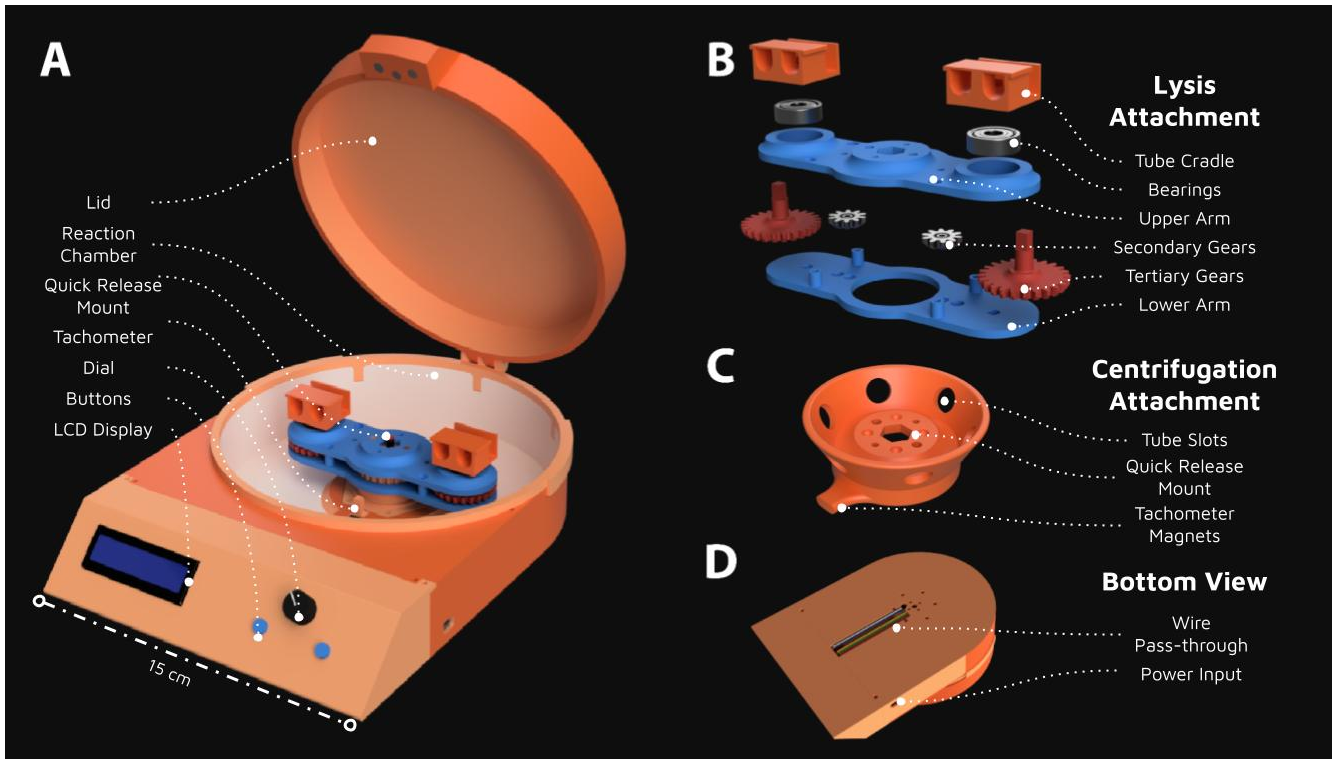- Low cost: Under $50 to build with common 3D-printed parts
- Portable and lightweight (0.8 kg)
- Battery-powered option for field use
- Safety features like motor shutdown and reinforced housing
- Modular design with easy switching between functions
In synthetic biology and molecular biology labs, DNA extraction is a fundamental but often costly process, requiring specialized equipment like bead homogenizers, microcentrifuges, and vortex mixers. These tools can cost thousands of dollars, which is often out of reach for resource-constrained laboratories, educational institutions, and field researchers. OpenCell addresses this need by providing an affordable, portable, and versatile solution that combines these three essential functions in one compact, open-source device.
Key Features of OpenCell
The OpenCell device integrates multiple laboratory functions at a fraction of the cost of commercial alternatives. Here are some standout features of this innovative tool:
- Low-Cost Build: OpenCell costs less than $50 to produce, making it accessible for a wide range of users. Using 3D-printed parts and off-the-shelf electronics, it offers a budget-friendly alternative to lab equipment that typically costs thousands.
- 3-in-1 Functionality: OpenCell combines the capabilities of a bead homogenizer, a microcentrifuge, and a vortex mixer. This all-in-one device allows users to perform essential steps for DNA extraction without the need for multiple machines.
- Compact and Portable: Weighing only 0.8 kg and about the size of a laptop, OpenCell is easy to transport. It’s ideal for mobile labs, remote research sites, or labs with limited space.
- Battery-Powered Option: OpenCell can run on batteries, making it highly adaptable for field use where electricity may not be available. With a single charge, it can operate long enough to process multiple samples.
- Safety Features: OpenCell is designed with several safety mechanisms, including motor shutoff if the device is improperly closed, programmable timers, and reinforced construction to prevent accidents during high-speed operations.
- Open-Source and Customizable: All design files, including 3D-printable components and software, are freely available. This means users can download, modify, and improve the design to meet their unique needs.
Applications
OpenCell is highly adaptable and can be used for various laboratory applications, particularly in settings where cost and portability are key considerations. Some of the primary uses include:
- DNA Extraction: The device has been tested successfully for DNA extraction from plant samples, achieving yields and purity levels comparable to commercial devices.
- Cell Lysis and Mixing: The epicyclic gear system in OpenCell enables efficient cell lysis, making it suitable for sample preparation in molecular biology studies.
- Field Research: With its lightweight and battery-powered design, OpenCell is ideal for on-site DNA extraction in remote locations. It’s perfect for field biologists, ecologists, or any researchers who work outside the lab.
Technical Details
The device is powered by an Arduino Nano microcontroller and uses a 2206 brushless motor for rotation. OpenCell’s modular attachments connect magnetically to a central motor, making it easy to switch between functions. The device has adjustable RPM settings and programmable timers, allowing users to tailor operations to their specific needs.
OpenCell’s components are largely 3D-printed, with materials like PLA (Polylactic Acid) providing a balance of durability and cost-effectiveness. For added resilience, more robust materials like ABS or PETG can be used. The OpenCell system is easy to assemble and disassemble, which simplifies maintenance and repair.
Testing and Validation
The OpenCell team has rigorously tested the device, particularly for DNA extraction from spinach samples. Results showed DNA yields within 5% of those achieved with commercial equipment, demonstrating OpenCell’s effectiveness. Further validation through PCR amplification confirmed that the DNA quality was suitable for downstream applications.
Why OpenCell Matters
OpenCell is more than just a piece of lab equipment. It represents a movement toward accessible, frugal science—making advanced tools available to a broader audience. OpenCell is especially beneficial for:
- Education: High schools, community colleges, and small universities with limited budgets can now access reliable DNA extraction tools for student experiments and research projects.
- Research in Low-Resource Settings: OpenCell supports scientific research in low- and middle-income countries, where budgets for expensive equipment are often limited.
- Field Science and Environmental Research: OpenCell’s portability and adaptability make it an ideal tool for field researchers who need to process samples on-site.
Get Involved
OpenCell’s open-source design means that anyone can contribute to its development. If you’re interested in making improvements, customizing features, or simply exploring the design, you can download the design files and assembly instructions for free. Visit the OpenCell GitHub page to access all the resources you need to get started.
For further questions or to connect with the development team, reach out via email at saadb@chbe.gatech.edu.

